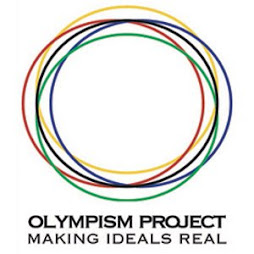
"I come to Berlin as so many of my countrymen have come before. [I] speak to you not as a candidate for President, but as...a fellow citizen of the world."
- Barack Obama, 24.07.08
Long before his address in the host city of the Games of Olympiad XI, Barack Obama already revealed his capacity for advancing Olympic ideals.
The friendship and international goodwill engendered by Obama's speeches before multi-hued crowds, the fair play on display in his disciplined refusal to demonize the political opposition, and the ethic of unity he brought to his campaign were all consistent with the principles of Olympism.
But did he also subtly reveal a glimpse of the inner Olympian with his choice to stop wearing a U.S. flag pin in the midst of the hotly-contested Democratic primary race?
As a U.S. Senator and in the early stages of his campaign for the Presidency, Obama obligatorily wore his nationalism on his lapel. Rare is the U.S. official who does not sport a flag pin, especially when that nation -- or at least its elected leadership -- is engaged in the unOlympic business of warmaking. How dare a candidate mute nationalism at such times, particularly one vying for the highest office in the land!
Barack Obama dared.
In an audacious declaration of renunciation, Obama unpinned himself from patriotic fashion in the midst of his campaign, insisting "I'm less concerned with what you're wearing on your lapel than what's in your heart."
Professional and amateur critics and pundits were quick to pounce: apparently, accessorizing is a crucial component of national leadership. (And, perhaps all too predictably, Obama compensated for his naked lapel with patriotic bluster elsewhere on the campaign trial, eventually capitulating to public and private pressure to re-pin himself -- the Olympic journey is defined by the struggle, if nothing else.)
Yet in spite of going momentarily bare-vested -- because of, for some -- Obama is now ascending the Presidential podium. Does this mean a majority of U.S. citizens are ready to start identifying themselves as world citizens? His courageous choice certainly fostered hope among those of a more humanitarian bent: One needn't prostrate to U.S. patriotism to become U.S. President.
Elsewhere on Earth, responses to Obama's election ranged from cautious optimism to outright jubilation. Many leaders from around the world, including some from within the International Olympic Committee, suspect that Obama may prove to be guided by a more globalist perspective than his Presidential predecessors.
Soon enough, Obama will reveal whether he is canvassing for the lofty principles of Olympism and not just for Chicago's 2016 Olympic bid. Obama has already begun his public campaign to convince the world -- the IOC at least -- that Chicaco would make the best host. And the scene in Chicago's Grant Park on November 4 was not lost on Olympic watchers: in an acceptance speech of Olympic proportions, Obama put the finishing touch on his 2008 campaign while simultaneously serving Chicago's 2016 candidacy.
But the position of the United States in the worldwide Olympic Movement is paradoxical: U.S.-based multi-national corporations contribute vast sums to Olympic coffers, including the single largest chunk of IOC revenue that comes from the awarding of U.S. broadcast rights, and athletes trained in the U.S. still dominate the Olympic podium. However, within the IOC, whose members will decide the 2016 election next October, the U.S. -- including the USOC, the ultimate broker of Chicago's bid -- suffers from a credibility gap: a spotty commitment to international cooperation and goodwill, in both sport and politics, could undermine its case to host the world for Olympiad XXXI.
Barack Obama could be instrumental in bridging this gap. The President-Elect has an unparalleled opportunity to demonstrate that he is truly a world citizen and not just another national partisan whose allegiance to humanity ends at the beginning of his nation's next election cycle.
To advance his hometown's 2016 prospects, Obama the aspiring Olympian could start by adorning his lapel with an Olympic Flag pin. Of course, this act would be a mere token gesture unless he becomes as well-versed in the Olympic Charter as he is in the U.S. Constitution.
But if the former law professor dives into Olympic scholarship, he may come to a conclusion that many other world citizens before him have reached: the current Olympic Victory Ceremony, with its national flags and national anthems, is inconsistent with Olympism, however politically and commercially beneficial it may be for those national subjects who garner the medals.
What to do? Obama might consider carrying his campaign for change all the way to the IOC by supporting a proposal to amend the Olympic Victory Ceremony to feature the Olympic Flag instead of national ones, symbolizing that the Games really are contests between individuals and not nations, which the Olympic Charter makes clear.
Of course, pundits would be quick to project political suicide if he supported such a position, including, no doubt, the same career guessers who predicted that momentary flaglessness would doom his bid for the Presidency. But depoliticizing the medal ceremony -- proposing to raise the Olympic flag for Olympic champions -- might be the most hopeful way to move undecided minds in the worldwide Olympic Movement -- mine included -- toward Chicago's bid.
It's also the most daring way for Obama to show an admiring world that Olympism unquestionably resides in his heart.
-- Nathaniel Lincoln Mills is a three-time Olympic speedskater, peace educator, and World Citizen born in Chicago.








